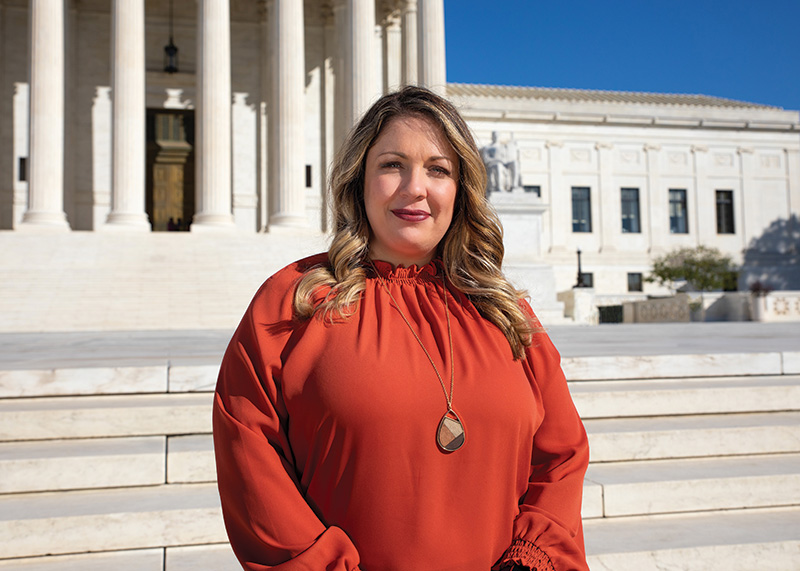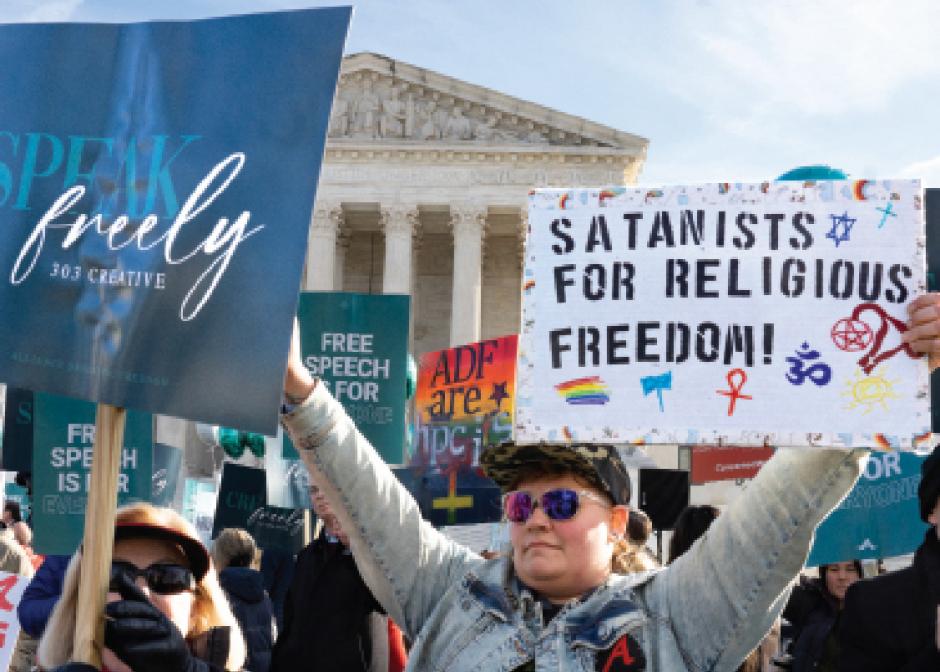Religious Free Speech at a Crossroads
Charles J. Russo March/April 2023In 303 Creative v. Elenis the Supreme Court again enters the legal and cultural minefield of LGBTQ nondiscrimination and claims of faith.
Last November the Senate passed the Respect for Marriage Act, codifying same-sex marriage into federal law and requiring states to recognize such unions if they are legal where they were entered. The bill also repealed the 1996 Defense of Marriage Act, which defined marriage as a relationship between one man and one woman. Days later, on December 5, 2022, the Supreme Court heard oral arguments in 303 Creative v. Elenis. The full Court participated. Justice Amy Coney Barrett declined to recuse herself, disregarding allegations that as a Catholic, she is prejudiced against same-sex marriages.
303 Creative involves the intersection of the competing interests of those entering same-sex marriages and the First Amendment rights of believers to freedom of speech and religion. In 2016 graphic artist Ms. Lorie Smith, founder and sole owner of a wedding design studio, sued Colorado’s Civil Rights Commission and attorney general, challenging Colorado’s Anti-Discrimination Act (CADA). According to CADA, “it is a discriminatory practice and unlawful for a person, directly or indirectly, to refuse, withhold from, or deny to an individual or a group, because of disability, race, creed, color, sex, sexual orientation, marital status . . . , the full and equal enjoyment of the goods, services, facilities, privileges, advantages, or accommodations of a place of public accommodation.”

Ms. Smith was generally willing to serve LGBTQ clients, never having turned one away. She drew the line at marriage, though, declining requests to create custom websites for same-sex nuptials. To do so, she believed, would violate her sincerely held Christian faith. Her goal in designing websites was to tell the stories of couples in ways that shared her religious beliefs about marriages as relationships between one man and one woman. Smith filed suit alleging that requiring her to comply with CADA by having to prepare same-sex wedding websites would have violated her First Amendment rights to the free exercise of religion and free speech by forcing her to engage in what courts call compelled speech.
Dueling Concerns
As noted, 303 Creative highlights the tension between two competing fundamental interests. On the one hand is Ms. Smith’s belief that requiring her to prepare websites for those with whose lifestyles she disagrees violates her First Amendment rights because she would have had to speak affirmatively on relationships she cannot endorse. Smith added that obligating her to create these websites would have infringed on her right to the free exercise of religion by compelling her speech, albeit using her artistic talents, to support a lifestyle contrary to her beliefs. On the other hand is the interest of same-sex couples to hire the wedding website designers and others they wish. 303 Creative thereby places the United States at a crossroads. Its outcome has the potential to shape the future of religious liberty as to whether states can override the fundamental constitutional rights to freedom of religion and speech.
Litigation has arisen over whether states can enact public accommodations laws such as CADA, allowing individuals to force believers to violate their faiths by having to provide services, either by baking cakes or creating websites. Moving beyond 303 Creative, could, for example, CADA or similar laws require owners of kosher or halal restaurants to prepare and serve pork products at customers’ requests? Or could bakers who are gay be made to prepare cakes displaying messages opposed to same-sex marriages? These scenarios raise the question as to why individuals would want people to disregard their beliefs, especially if others are willing to provide the services they seek?
Muddied Legal Waters
303 Creative began six years ago when Ms. Smith filed suit challenging CADA as violating her rights to the free exercise of religion and speech, among others. Without reaching the merits of her claims, the federal trial court in Colorado granted the state’s motion for summary judgment, essentially dismissing Smith’s effort to prevent CADA’s enforcement.
In 2020 a split Tenth Circuit affirmed that Ms. Smith was not free to refrain from creating websites for same-sex couples, even in conceding that requiring her to create websites would have violated her conscience. The court remarked that while CADA did not guarantee equal access to custom-made wedding websites generally, it applied specifically to Smith because the state had a compelling interest in protecting marginalized groups, granting them protected class status, and was narrowly tailored to achieve its goal. The chief judge of the Tenth Circuit dissented, focusing on Smith’s claim that ordering her to develop websites would have resulted in compelled speech.
303 Creative revisits 2018’s Masterpiece Cakeshop v. Colorado Civil Rights Commission. In that case the Supreme Court avoided the merits of the First Amendment religion claims after a same-sex couple filed a complaint against a baker who declined preparing a cake for their wedding because doing so conflicted with his Christian beliefs. The justices reasoned that the commission’s treatment of the baker violated its First Amendment duty not to base laws or regulations on hostility to religion or religious perspectives. The Court explained that the commission’s official expressions of hostility to the baker’s religious beliefs, as reflected in comments by one member in particular and other panelists, were inconsistent with its responsibility not to demonstrate antipathy toward his views.
Not surprisingly, Ms. Smith appealed to the Supreme Court. On February 22, 2022, the justices agreed to hear Smith’s case but limited their review to the free, or compelled, speech claim, sidestepping her charge that directing her to provide her services would have violated her right to the free exercise of religion. The Court thus identified the sole question before it as “whether applying a public-accommodation law to compel an artist to speak or stay silent violates the free speech clause of the First Amendment.”
Agreeing to hear Ms. Smith’s free speech claim, the Supreme Court pointed out that “the Tenth Circuit applied strict scrutiny and astonishingly concluded that the government may, based on content and viewpoint, force Lorie to convey messages that violate her religious beliefs.” When courts apply strict scrutiny, in order for governmental restrictions on fundamental rights such as freedom of speech or religion to survive, they must be justified by compelling state interests and be narrowly tailored to achieve those goals. When the Supreme Cout applies strict scrutiny, as it did last summer in Kennedy v. Bremerton School District deciding that public school officials in Washington could not prevent a football coach from kneeling silently in prayer on the field after games, it rarely upholds governmental restrictions on fundamental rights.
In accepting Ms. Smith’s appeal, the Supreme Court observed that the Tenth Circuit “upheld CADA . . . even though CADA creates a ‘gerrymander’ where secular artists can decline to speak but religious artists cannot, meaning the government can compel its approved messages.” While the Court is avoiding the religious claim it may eventually have to face, it revisited compelled speech, a topic it most recently considered in 2018 in Janus v. American Federation of State, County, and Municipal Employees, Council 31.
The Janus Court ruled in favor of a nonunion public employee, a child support specialist in Illinois, who objected to the state law requiring him to pay fair share fees to a union for costs associated with representing his interests in bargaining. The justices agreed that because the union supported positions with which the nonmember disagreed, having him pay the fees violated his First Amendment right as compelled speech, an approach similar to Ms. Smith’s.
303 Creative has the potential to become one of the Supreme Court’s most significant decisions ever on religious free speech. At issue in 303 Creative is whether states can enact public accommodations laws requiring individuals to speak, albeit through their creative efforts, on matters with which they disagree or whether they are free to remain silent by not making their services available without facing discrimination charges.
A Middle Path?
During oral arguments it appeared that a majority of justices supported Ms. Smith’s right to practice her faith by refraining from compelled speech. Still, it remains to be seen how 303 Creative is resolved. And even if Ms. Smith prevails, it may be a pyrrhic victory. In passing the Respect for Marriage Act last year, Congress was unwilling to safeguard the rights of individuals, confining protection to “nonprofit religious organizations” whose “principal purpose is the study, practice, or advancement of religion.” This means that Ms. Smith, and others, may yet be subject to discrimination charges that can potentially damage their reputations and livelihoods while being subject to expensive litigation under its provisions.
At the same time, more must be done to safeguard cake and flower shop owners, wedding vendors, photographers, artists, and others who have been sued for discrimination because their faiths prevent them from serving those entering same-sex unions. Protections must also be extended to faith-based women’s shelters, orphanages, hospitals, and child-care facilities whose beliefs include that marriage is a relationship between one man and one woman, or else they and their employees may be vulnerable to discrimination claims for exercising their First Amendment rights.
Regardless of its outcome, likely to be released at the end of the Supreme Court’s term in late June, 303 Creative may have profound, far-reaching consequences for people of faith, members of the LGBT community, and what many refer to as America’s cornerstone first freedom, religious freedom. Hopefully, the Supreme Court and Congress can avoid a “winner takes all” approach by establishing a middle ground to preserve freedom of religion and speech by accommodating individuals on both sides of this controversy.
Congress and the Supreme Court must act to continue to ensure robust freedom of religious speech in our increasingly pluralistic society by safeguarding the rights of all Americans to equal treatment, regardless of their beliefs and/or sexual orientations. If Congress and the Court act, then religious institutions and people of faith can continue to flourish. Individuals can honor their beliefs as they speak, or not speak, in service of the common good in a society in which mutual respect and toleration of disagreement—without personal disagreeableness—is the norm.
Article Author: Charles J. Russo
Charles J. Russo, M.Div., J.D., Ed.D., is the Joseph Panzer chair in education in the School of Education and Health Sciences, director of its Ph.D. program in educational leadership, and research professor of law in the School of Law at the University of Dayton. He can be reached at crusso1@udayton.edu.
